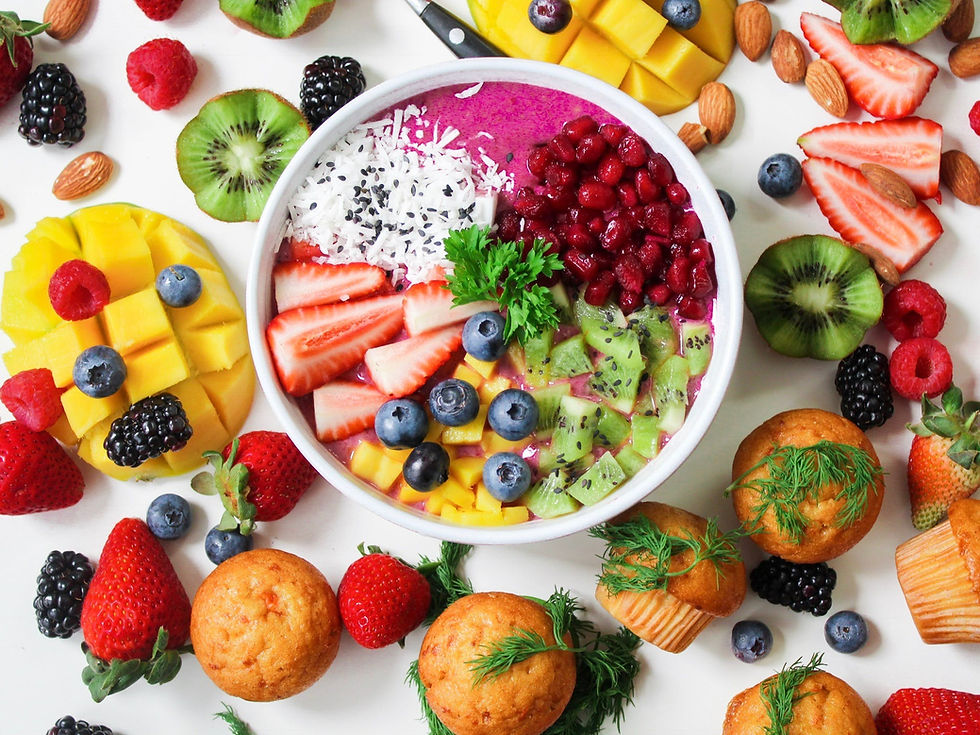Prebiotics: The Key to a Healthy Gut?
- Rebecca

- Aug 6, 2024
- 2 min read
Prebiotics are a type of non-digestible fibre that serves as food for beneficial bacteria in your gut. Unlike probiotics, which are live bacteria found in certain foods and supplements, prebiotics are compounds that foster a healthy gut environment by stimulating the growth and activity of beneficial microorganisms. They pass through the upper part of the gastrointestinal tract undigested and reach the colon, where they are fermented by gut bacteria, providing numerous health benefits.
Incorporating prebiotics into your diet can have a positive impact on your health. Here are some of the key benefits:
1. Improved Gut Health - Prebiotics promote the growth of beneficial bacteria in the gut, which can help maintain a balanced gut microbiome. A healthy gut microbiome is crucial for efficient digestion, nutrient absorption, and immune function.
2. Enhanced Immune Function - By supporting the growth of good bacteria, prebiotics help strengthen the gut barrier and enhance immune responses, protecting against infections and reducing inflammation.
3. Better Digestion and Regularity: Prebiotic fibres can improve bowel regularity and prevent constipation by increasing stool bulk and water content.
4. Mental Health Benefits - Emerging research suggests a strong connection between gut health and mental health, often referred to as the gut-brain axis. A healthy gut can potentially improve mood and cognitive function.
5. Weight Management: Prebiotics can help regulate appetite and support weight management by promoting the production of hormones that signal fullness.
Adding prebiotics to your diet doesn't have to be complicated. Here are some simple ways to include them in your daily meals:
1. Eat Prebiotic-Rich Foods - Incorporate foods high in prebiotic fibres into your diet. These include:
- Garlic and Onions: These flavourful ingredients not only enhance your dishes but also provide a good amount of prebiotic fibres.
- Asparagus and Leeks: Both vegetables are excellent sources of prebiotics and can be easily added to salads, soups, and stir-fries.
- Bananas: Especially when slightly green, bananas are a convenient and tasty source of prebiotic fibre.
- Whole Grains: Foods like oats, barley, and wheat bran contain prebiotic fibres and are versatile additions to many meals.
- Legumes: Beans, lentils, and peas are not only rich in prebiotics but also provide protein and other essential nutrients.
- Root Vegetables: Sweet potatoes and yams are great sources of prebiotics.
If you suffer with IBS, or digestive discomfort such as bloating or diarrhoea you might find that increasing your intake of prebiotics may aggravate your symptoms. Read my guide on including prebiotics with IBS here.
2. Try Prebiotic Supplements - If you're finding it difficult to get enough prebiotics from food alone, consider taking a prebiotic supplement. These are available in various forms, including powders and capsules.
3. Combine Prebiotics with Probiotics: Consuming prebiotics alongside probiotics (found in fermented foods like yogurt, kefir, and sauerkraut) can enhance their effectiveness. Prebiotics feed the probiotics, helping them thrive and improve your gut health.
Prebiotics play a vital role in maintaining a healthy gut and overall well-being. By understanding what prebiotics are and how they benefit your body, you can make informed choices about incorporating them into your diet.
Start by adding prebiotic-rich foods to your meals, trying supplements if needed, and enjoying the numerous health benefits that come with a balanced gut microbiome. Your gut—and your whole body—will thank you!




Comments